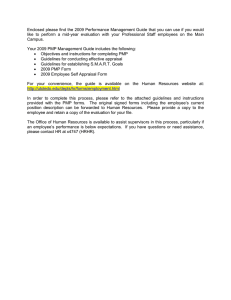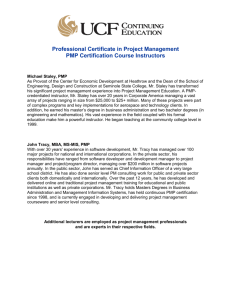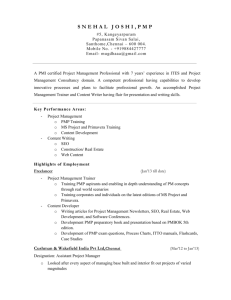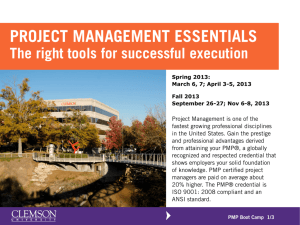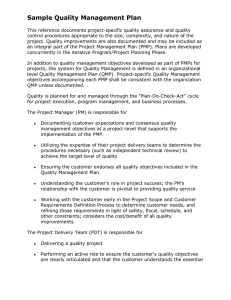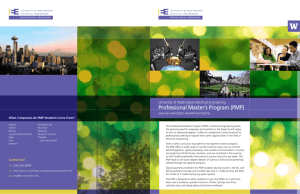in Electrical Engineering - University of Washington
advertisement
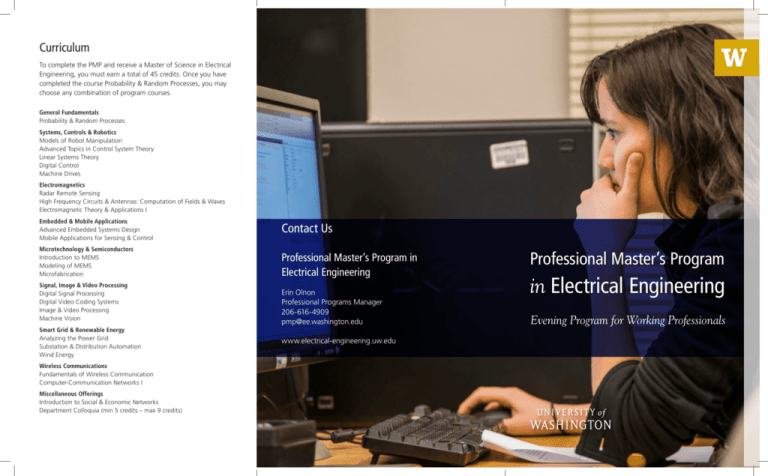
Curriculum To complete the PMP and receive a Master of Science in Electrical Engineering, you must earn a total of 45 credits. Once you have completed the course Probability & Random Processes, you may choose any combination of program courses. General Fundamentals Probability & Random Processes Systems, Controls & Robotics Models of Robot Manipulation Advanced Topics in Control System Theory Linear Systems Theory Digital Control Machine Drives Electromagnetics Radar Remote Sensing High Frequency Circuits & Antennas: Computation of Fields & Waves Electromagnetic Theory & Applications I Embedded & Mobile Applications Advanced Embedded Systems Design Mobile Applications for Sensing & Control Microtechnology & Semiconductors Introduction to MEMS Modeling of MEMS Microfabrication Signal, Image & Video Processing Digital Signal Processing Digital Video Coding Systems Image & Video Processing Machine Vision Smart Grid & Renewable Energy Analyzing the Power Grid Substation & Distribution Automation Wind Energy Wireless Communications Fundamentals of Wireless Communication Computer-Communication Networks I Miscellaneous Offerings Introduction to Social & Economic Networks Department Colloquia (min 5 credits – max 9 credits) Contact Us Professional Master’s Program in Electrical Engineering Erin Olnon Professional Programs Manager 206-616-4909 pmp@ee.washington.edu www.electrical-engineering.uw.edu Professional Master’s Program in Electrical Engineering Evening Program for Working Professionals Discover the Future of Electrical Engineering The University of Washington Professional Master’s Program (PMP) in Electrical Engineering focuses on modern technical topics and the latest university research, giving you the depth you need to drive innovation. This program serves the growing need for engineers and scientists with advanced degrees in the Puget Sound region. With a leading curriculum equivalent to that of the daytime master’s program, the PMP offers a wide range of courses covering areas such as smart grid and renewable energy; systems, controls and robotics; electromagnetics; signal, image and video processing; embedded and mobile applications; microelectromechanical systems; and wireless communications. Enter or Advance in a Growing Field Traditional electrical engineering programs focus on classic areas — power, signal processing, communication and control. We do all of those, and we do those really well, but we’ll take you beyond that to the frontiers of robotics, biomedical applications and alternative energy. — Blake Hannaford, Professor, Professional Master’s Program in Electrical Engineering Whether you recently graduated from an undergraduate program, are already working as an electrical engineer or want to break into a new field, the PMP will prepare you for new and rewarding career opportunities. You will benefit from the diverse perspectives of your classmates. Students include electrical engineers seeking more technical depth and professionals from a variety of other backgrounds, such as software engineering, financial engineering and law, who are looking to enter the electrical engineering field. The master’s allowed me to change the level of responsibility that I have [at work]. We covered everything from protocols at the digital level all the way to propagation and antennas. So if you take all of that knowledge and combine it, that’s exactly what I’m applying [to my work at] Kymeta. — Michael Hansen, 2012 Graduate, Professional Master’s Program in Electrical Engineering Director of Communications and Systems Engineering, Kymeta Corporation Leverage Cutting-Edge Research Our world-class faculty ensure the program is dynamic and responsive to the changing needs of our students, and their employers, as they apply what they learn to their careers. Faculty members bring years of professional experience and new research to the classroom. The teachers are great researchers in the field and incorporate the latest developments into their teaching. For example, when I’m teaching about power system economics, I can incorporate what we have discovered doing research. — Daniel Kirschen, Professor, Professional Master’s Program in Electrical Engineering Take Advantage of the Convenient Evening Format The Professional Master’s Program in Electrical Engineering is designed to fit the busy schedules of working professionals, with evening classes held at the UW campus in Seattle. You can complete the program in three years of part-time study or one-and-a-half years of full-time study.
